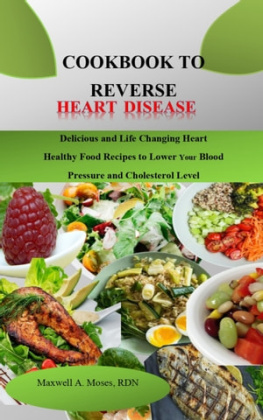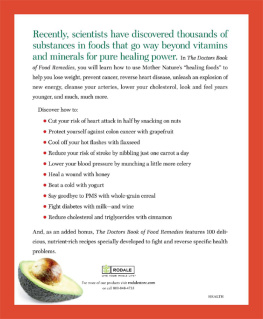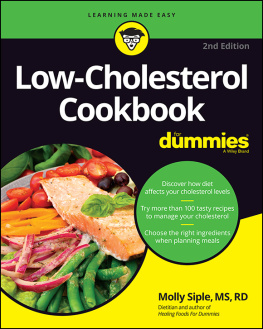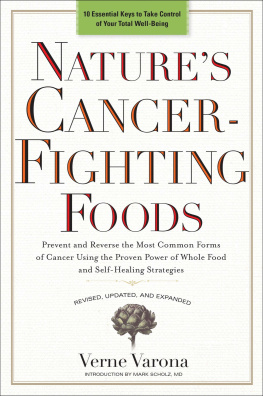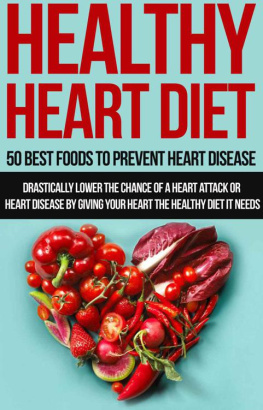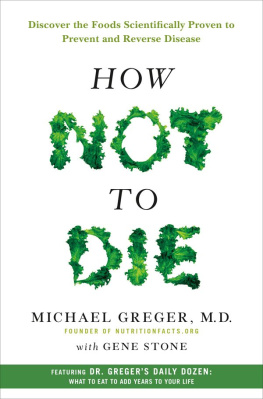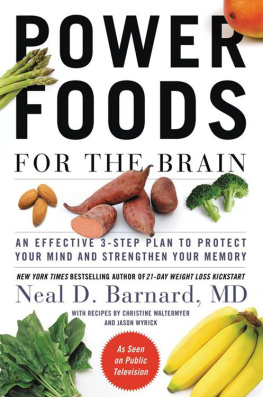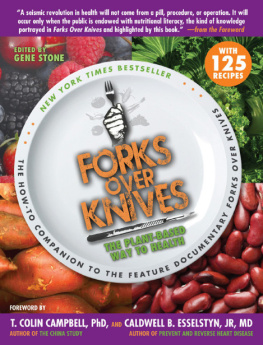Surprising new ways
to prevent a broad range of illnesses, with:
Denis Burkitt, M.D., on how food choices lead to common
conditions, from cancer to varicose veins.
John McDougall, M.D., physician, medical lecturer, and author, on food choices in osteoporosis, kidney disease, and other common problems.
Monroe Rosenthal, M.D., Medical Director of the Pritikin Program, on the role of foods in diabetes and other conditions.
How what you eat affects
your mood and mental functioning, with:
Richard Wurtman, M.D., of the Massachusetts Institute of Technology, on how foods affect brain chemistry.
C. Keith Conners, Ph.D., of Childrens Hospital in Washington,
D.C., on how foods affect the childs mind and behavior.
Insights on our natural diet, from:
Jane Goodall, Ph.D., renowned primatologist, on the natural diet of primates.
Richard Leakey, Ph.D., paleoanthropologist, on the evolution of the human diet.
Surprising findings from Asia, with:
T. Colin Campbell, Ph.D., of Cornell University, the head of the China Diet and Health Study, on what Asian diets can tell us about our own.
Anthony Sattilaro, M.D., former President of Methodist Hospital, Philadelphia, on foods as a treatment for cancer.
Keeping a healthy heart,
with important information from:
William Castelli, M.D., Director of the Framingham Heart Study, on cholesterol and heart disease.
Earl Benditt, M.D., of the University of Washington, on tumors in the heart.
Michael DeBakey, M.D., Heart surgeon, Methodist Hospital, Houston, Texas, on preventing heart disease.
Vital facts on preventing cancer
with the perspectives of:
John Bailar, M.D., Ph.D., former Editor-in-Chief of the Journal of the National Cancer Institute, on redirecting the War on Cancer.
Oliver Alabaster, M.D., of the George Washington University Medical Center, on how food choices prevent cancer.
Peter Greenwald, M.D., of the National Cancer Institute, on how vitamins in foods can prevent cancer.
Denis Burkitt, M.D., leading authority on fiber, on how fiber protects against cancer of the colon and breast.
The latest on controlling your weight,
with vital information from:
William Connor, M.D., of the University of Oregon, on how food selections help control weight.
C. Wayne Callaway, M.D., formerly of the Mayo Clinic and the George Washington University Medical Center, on how timing factors affect weight.
Contaminants of all kinds in our foods,
and what to do about them, with:
Carol Tucker Foreman, former Assistant Secretary of Agriculture, on what you didnt know was in your grocery bag.
Mitchell Cohen, M.D., of the Centers for Disease Control, on how bacteria in foods can cause illness.
THE
POWER
OF YOUR
PLATE
A Plan for Better Living
Eating well for better health
20 experts tell you how!
By Neal D. Barnard, M.D.
Author of Food For Life

Copyright 1995 Dr. Neal Barnard
ISBN 1-57067-003-X
All rights reserved. No portions of this book may be reproduced by any means whatsoever except for brief quotations in reviews, without written permission from the publisher.
Cover design by Doug Hall
Barnard, Neal., 1953
The power of your plate : a plan for better living / by Neal D. Barnard, author of Food for life.
p. cm.
Previously published: 1990
Includes bibliographical references and index.
ISBN 1-57067-003-X
1. Nutrition. 2. Nutritionally induced diseases. I. Title.
QP141,B263 |
612.3--dc20 | 94-43222 |
CIP |
Also by Dr. Barnard:
A Physicians Slimming Guide Summertown, TN: Book Publishing Company, 1992
Live Longer, Live Better Cassette. Summertown, TN: Book Publishing Company, 1992
Food for Life New York, NY: Harmony Books, 1993
Printed in Canada
Notice to Readers
This book provides detailed information on how food choices improve health. It does not take the place of individualized medical care. If you have any medical condition, are taking medication, or are over forty, please see your doctor before changing your diet or increasing your physical activity. Changes in diet and exercise sometimes necessitate a change in medications or in other aspects of medical care.
Vegetarian diets are very powerful and healthful. Assuring an appropriate intake of vitamin B-12 does require a little planning, however, so please consult the simple guidelines on page 197. This is important for everyone, but particularly for children and pregnant or nursing women.
The animal-based diet that most Westerners currently follow is risky. If you are on such a diet and, for whatever reason, you decide to stay on it, please see your physician regularly, continue to read about the value of changing your diet, and please encourage others not to follow your example.
Similarly, diets based on poultry or fish are extremely weak and are not recommended. They do not provide the cholesterol-lowering, weight-reducing, or cancer-preventive effects that come from a plant-based diet, and they do not reverse heart disease in most patients.
If you would like additional information about nutrition and health issues, let me encourage you to subscribe to Good Medicine, a quarterly magazine published by the Physicians Committee for Responsible Medicine. It is available for an annual subscription price of $20 from PCRM, Box 6322, Washington, D.C. 20015. I can be reached at the same address, and would very much like to hear how you are doing with your new program for health. Good luck!
Neal D. Barnard, M.D.
Table of Contents
Introduction
Healthy eating is a gold mine. With the right food selections, you can lose weight permanently, without restrictive diets. You can prevent heart attacks and even reverse existing heart disease. Through a combined approach of life-style changes, as much as eighty percent of cancer can be prevented. Millions of cases of what passes for the flu actually came into our homes in our groceries. We can prevent those as well. We can use foods to get a good nights sleep without sleeping pills, and can plan a morning meal that will help us feel alert through the day.
We will look at the best and latest information on healthy eating from leading authorities. These experts usually write for other scientists and doctors, rather than for the lay public. But they have found the very best ways to control weight permanently, to lower cholesterol dramatically, to prevent cancer, and to do many other things through simple and straightforward food choices. You should know about it.
Many of the things I discovered in preparing this book surprised me too. As a doctor, I knew about the importance of nutrition, but, like most physicians, I began my career without taking the time to look at the real state of the art in nutrition research. Years ago, when the University Hospital swallowed me along with the other frightened medical students, we had too much on our minds to think about healthy eating. Our neckties were awkwardly knotted under our collars. Our white jackets were baggy and too short. We were terrified of drowning in the long hours of demanding, detailed work. Nutrition, preventive medicine, and health in general never figured in our minds. With junk food stuffed in our pockets and plenty of black coffee and cigarettes, we were determined only to survive.
Next page

